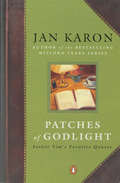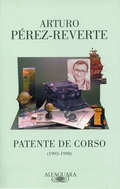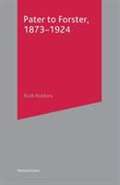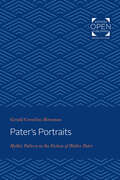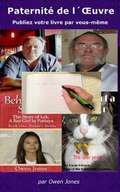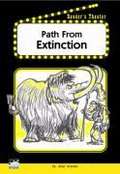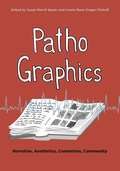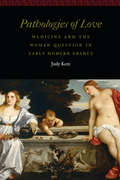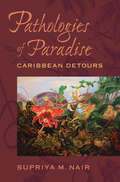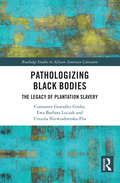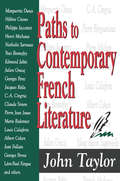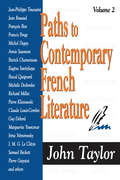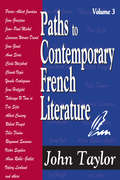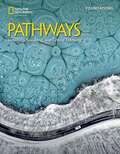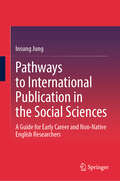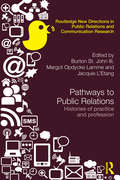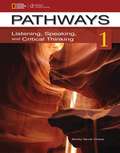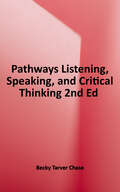- Table View
- List View
Pat's Cats (Word Family Readers)
by Liza CharlesworthLet's Learn Readers boost key literacy skills through engaging, easy-to-read stories. Jump-start phonics learning with these super-fun books! For use with Grades K-2.
Patabahar Bengali class 3 - West Bengal Board: পাতাবাহার বাংলা। তৃতীয় শ্রেণি
by West Bengal Board of Primary Educationপাতাবাহার বাংলা পাঠ্যবইটি পশ্চিমবঙ্গ প্রাথমিক শিক্ষা পর্ষদের উদ্যোগে তৃতীয় শ্রেণির শিক্ষার্থীদের জন্য তৈরি একটি শিশুকেন্দ্রিক ও কার্যভিত্তিক পাঠ্যবই। এই বইটি জাতীয় পাঠ্যক্রমের রূপরেখা ২০০৫ (NCF 2005) এবং শিক্ষার অধিকার আইন ২০০৯ (RTE 2009)-এর ভিত্তিতে নির্মিত। বইটির মূল ভাবনা “প্রচলিত গল্পকথার জগৎ”-কে কেন্দ্র করে সাজানো হয়েছে, যার মাধ্যমে গল্প, কবিতা, গান, চিত্রাঙ্কন, নাটক এবং হাতে-কলমে কাজের মাধ্যমে শিশুদের শেখার প্রতি আগ্রহ সৃষ্টি করা হয়েছে। এতে রয়েছে “সত্যিসোনা”-র মতো গল্প, যা পরিশ্রম ও বুদ্ধিমত্তার গুরুত্ব শেখায়, এবং “নিজের হাতে নিজের কাজ”, যা আত্মনির্ভরশীলতা ও সম্মানের বার্তা দেয়। রবীন্দ্রনাথ ঠাকুর, সুখলতা রাও-সহ বহু বিশিষ্ট লেখকের রচনা এই বইয়ে অন্তর্ভুক্ত হয়েছে, যা শিশুদের কল্পনা, ভাষা ও নৈতিক বোধ গড়ে তুলতে সহায়তা করে। বইয়ের শেষে “ভাষাপাঠ” অংশে ব্যাকরণ ও বাক্য নির্মাণের মাধ্যমে ভাষা শিক্ষার ভিত্তি গঠন করা হয়েছে। অভিজ্ঞ শিক্ষাবিদ ও বিশেষজ্ঞদের সহযোগিতায় নির্মিত এই বই শিক্ষাকে আনন্দদায়ক, অন্তর্ভুক্তিমূলক ও মূল্যবোধ-নির্ভর করে তোলার একটি সফল প্রয়াস।
Patabahar Bengali class 4 - West Bengal Board: পাতাবাহার বাংলা চতুর্থ শ্রেণি
by West Bengal Board of Primary Education"পাতাবাহার: চতুর্থ শ্রেণি" পাঠ্যপুস্তকটি পশ্চিমবঙ্গ প্রাথমিক শিক্ষা পর্ষদ কর্তৃক প্রকাশিত একটি মনোগ্রাহী ও শিশু-কেন্দ্রিক বই। জাতীয় পাঠ্যক্রমের রূপরেখা ২০০৫ ও শিক্ষার অধিকার আইন ২০০৯ অনুসরণে নির্মিত এই বইয়ের মূল ভাবনা হলো "রোমাঞ্চকর অভিজ্ঞতা ও খেলার জগৎ"। কবিতা, গল্প, গান ও নানা সৃজনশীল কার্যকলাপের মাধ্যমে এই বই বাংলা ভাষা শিক্ষার পাশাপাশি কল্পনাশক্তি, মূল্যবোধ ও পরিবেশ সচেতনতা গড়ে তুলতে সাহায্য করে। প্রতিটি পাঠ শিক্ষার্থীদের নিজে করে শেখার দিকে উৎসাহিত করে—অভিনয়, ছবি আঁকা, সংগীত, হাতের কাজ ইত্যাদির মাধ্যমে আনন্দময় উপায়ে শেখানো হয়েছে। বিশিষ্ট শিক্ষাবিদ, শিক্ষক ও বিশেষজ্ঞদের তত্ত্বাবধানে প্রণীত এই বইটি শিশুদের কৌতূহল ও চিন্তাশক্তিকে উৎসাহিত করে একটি অন্তর্ভুক্তিমূলক ও আনন্দময় শিক্ষার পরিবেশ গড়ে তোলে, যা পশ্চিমবঙ্গ সরকারের শিক্ষাদর্শের সঙ্গে সামঞ্জস্যপূর্ণ।
Patches of Godlight
by Jan KaronWritten in Father Tim Kavanagh's own hand, this wonderful collection of quotes brings to life the personal reflections of Mitford's beloved Episcopal priest. Here Father Tim has carefully recorded his favorite quotes from a variety of thinkers, philosophers, and poets whom he has admired over the years. Next to the quotes are Father Tim's personal comments, scribblings, and doodlings. From C. S. Lewis and Mark Twain to Aristophanes and St. Paul, these heartwarming words on love, life, and faith are a perfect addition to the Mitford series-and a must-have for Jan Karon's millions of readers.
Patente de corso (1993-1998)
by Arturo Pérez-ReverteRecopilación de los artículos publicados por Arturo Pérez-Reverte en la revista El Semanal desde finales del año 1993 hasta el 1998. Desde 1994, cuatro millones de lectores de numerosos periódicos españoles leen cada fin de semana el artículo que Arturo Pérez-Reverte publica en el suplemento dominical El Semanal: su polémica, original y personalísima página de opinión. Patente de corso recoge una amplia selección de esos textos, de los que el propio autor ha dicho: «Escribo con tanta libertad que me sorprende que me dejen.» De ellos se puede disentir, participar, asumir o no sus postulados; pero es imposible no contagiarse con la fascinación de su honestidad salvaje, su compromiso personal y su coherencia. Porque son la mirada de veintiún años como reportero y el espejo de la Literatura, aplicados a quemarropa sobre la sociedad contemporánea.
Pater to Forster, 1873 – 1924 (Transitions Ser.)
by Ruth RobbinsWas the late nineteenth century 'Victorian' or 'modern'? Why did the New Woman disappear from literary history? Where did T. S. Eliot's poetics of the city come from? In this essential guide, Ruth Robbins explores an era often named an 'age of transition' which exists uneasily between the apparent certainties of the Victorians and the advent of a Modernist aesthetics of instability. Robbins considers some of the central literary categories and themes of the period (decadence, realism, nostalgia, New Woman writing, degeneration, imperialism and early modernism) in writings by both major and 'minor' writers, thereby creating a complex picture of transitions, continuities and breaks with the past. By examining this tumultuous era as an age in its own right, Pater to Forster, 1873-1924 offers the reader a rather different history of the late Victorians and Modernists, and retells that history from a new perspective.
Pater's Portraits: Mythic Pattern in the Fiction of Walter Pater
by Gerald Cornelius MonsmanOriginally published in 1967. Monsman undertakes a comprehensive critical analysis of Walter Pater's fiction, which presents the critic with numerous causes of frustration, not the least of which is a lack of both dramatic narration and description. Pater is rarely vivid and firsthand in his fiction; he tends instead toward exposition. Monsman's emphasis in Pater's Portraits is "tracing out" the conscious artistic structure of Pater's fiction. The scope of Pater's writings comprises nothing less than Western culture itself; its subject is all that man has written, thought, said, sung, hoped, or prayed as a civilized creature over two and one-half millennia. Pater's success in handling such panoply is attributable to his discovery of a coherent pattern by which art, religion, and life can be organized. Monsman aims to discover in Pater's fiction the use of old scientific-religious patterns of myth to explain moments of religious and cultural awakening, to reveal the way in which one man arrived at a credo that would answer to the desolation of life and culture.
Paternité de l´œuvre: Publiez votre livre par vous-même
by Owen JonesCe livre constitue un matériel d´assistance pour ceux qui veulent écrire, écrivent ou ont écrit un livre. Il sert de guide à l´écriture et à l´auto-publication. Il n´est pas censé être un guide détaillé sur le style, cependant, vous pouvez également trouver quelques conseils à ce sujet. Alors, pour ce faire, nous partons du principe que vous êtes sur le point de commencer à écrire, vous êtes en train d´écrire ou que vous avez écrit un « manuscrit électronique », et que vous voulez savoir comment le publier vous-même auprès des grands éditeurs et distributeurs sous forme d´impression et en livre électronique. Le manuscrit électronique est un oxymore, nous utiliserons donc le mot «script» dans le reste du livre. Votre script est peut-être près pour l'impression ou pas, mais ce livre vous aidera à tout régler. En plus de la mise en forme de votre script, le présent livre vous aidera également à choisir où le publier, comment le publier, comment obtenir une couverture, comment le promouvoir, où le vendre et tout ce dont vous devez faire pour que les gens achètent votre livre. J'ai écrit et auto-publié plus de 110 de mes propres livres et aidé d´autres auteurs à publier leurs livres. J'ai maintenant une société d'édition appelée « Megan Publishing Services » accessible en ligne. En plus de cela, j'ai un script que j'ai fini d'écrire il y a quelques jours et je vais utiliser mon expérience pour le publier comme modèle utilisé dans ce livre et je vais tester le processus en publiant ce livre. Par conséquent, en lisant ce livre, vous suivrez la publication réelle «en direct» d´un vrai livre en temps figé. Le livre fait partie de ma collection « Megan Series » et s'appelle « Megan's School Trip ». Vous pouvez vérifier qu'il est en vente en ligne quand vous le souhaitez. Je partagerai également avec vous mon «plan de promotion à trente et un poi
Path from Extinction
by Stephen Cosgrove Pam Hirschfeld Karen LeonPerform this script about two members of the human species who hold a meeting during the Ice Age to discuss how to avoid extinction.
PathoGraphics: Narrative, Aesthetics, Contention, Community (Graphic Medicine #20)
by Susan Merrill Squier Irmela Marei Krüger-FürhoffCulturally powerful ideas of normalcy and deviation, individual responsibility, and what is medically feasible shape the ways in which we live with illness and disability. The essays in this volume show how illness narratives expressed in a variety of forms—biographical essays, fictional texts, cartoons, graphic novels, and comics—reflect on and grapple with the fact that these human experiences are socially embedded and culturally shaped. Works of fiction addressing the impact of an illness or disability; autobiographies and memoirs exploring an experience of medical treatment; and comics that portray illness or disability from the perspective of patient, family member, or caregiver: all of these narratives forge a specific aesthetic in order to communicate their understanding of the human condition. This collection demonstrates what can emerge when scholars and artists interested in fiction, life-writing, and comics collaborate to explore how various media portray illness, medical treatment, and disability. Rather than stopping at the limits of genre or medium, the essays talk across fields, exploring together how works in these different forms craft narratives and aesthetics to negotiate contention and build community around those experiences and to discover how the knowledge and experiences of illness and disability circulate within the realms of medicine, art, the personal, and the cultural. Ultimately, they demonstrate a common purpose: to examine the ways comics and literary texts build an audience and galvanize not just empathy but also action.In addition to the editors, the contributors to this volume include Einat Avrahami, Maureen Burdock, Elizabeth J. Donaldson, Ariela Freedman, Rieke Jordan, stef lenk, Leah Misemer, Tahneer Oksman, Nina Schmidt, and Helen Spandler.Chapter 7, "Crafting Psychiatric Contention Through Single-Panel Cartoons," by Helen Spandler, is available as Open Access courtesy of a grant from the Wellcome Trust. A link to the OA version of this chapter is forthcoming.
PathoGraphics: Narrative, Aesthetics, Contention, Community (Graphic Medicine)
by Susan Merrill Squier Irmela Marei Krüger-FürhoffCulturally powerful ideas of normalcy and deviation, individual responsibility, and what is medically feasible shape the ways in which we live with illness and disability. The essays in this volume show how illness narratives expressed in a variety of forms—biographical essays, fictional texts, cartoons, graphic novels, and comics—reflect on and grapple with the fact that these human experiences are socially embedded and culturally shaped. Works of fiction addressing the impact of an illness or disability; autobiographies and memoirs exploring an experience of medical treatment; and comics that portray illness or disability from the perspective of patient, family member, or caregiver: all of these narratives forge a specific aesthetic in order to communicate their understanding of the human condition. This collection demonstrates what can emerge when scholars and artists interested in fiction, life-writing, and comics collaborate to explore how various media portray illness, medical treatment, and disability. Rather than stopping at the limits of genre or medium, the essays talk across fields, exploring together how works in these different forms craft narratives and aesthetics to negotiate contention and build community around those experiences and to discover how the knowledge and experiences of illness and disability circulate within the realms of medicine, art, the personal, and the cultural. Ultimately, they demonstrate a common purpose: to examine the ways comics and literary texts build an audience and galvanize not just empathy but also action.In addition to the editors, the contributors to this volume include Einat Avrahami, Maureen Burdock, Elizabeth J. Donaldson, Ariela Freedman, Rieke Jordan, stef lenk, Leah Misemer, Tahneer Oksman, Nina Schmidt, and Helen Spandler.Chapter 7, “Crafting Psychiatric Contention Through Single-Panel Cartoons,” by Helen Spandler, is available as Open Access courtesy of a grant from the Wellcome Trust. A link to the OA version of this chapter is forthcoming.
Pathologies of Love: Medicine and the Woman Question in Early Modern France (Women and Gender in the Early Modern World)
by Judy KemPathologies of Love examines the role of medicine in the debate on women, known as the querelle des femmes, in early modern France. Questions concerning women&’s physical makeup and its psychological and moral consequences played an integral role in the querelle. This debate on the status of women and their role in society began in the fifteenth century and continued through the sixteenth and, as many critics would say, well beyond. In querelle works early modern medicine, women&’s sexual difference, literary reception, and gendered language often merge. Literary authors perpetuated medical ideas such as the notion of allegedly fatal lovesickness, and physicians published works that included disquisitions on the moral nature of women. In Pathologies of Love, Judy Kem looks at the writings of Christine de Pizan, Jean Molinet, Symphorien Champier, Jean Lemaire de Belges, and Marguerite de Navarre, examining the role of received medical ideas in the querelle des femmes. She reconstructs how these authors interpreted the traditional courtly understanding of women&’s pity or mercy on a dying lover, their understanding of contemporary debates about women&’s supposed sexual insatiability and its biological effects on men&’s lives and fertility, and how erotomania or erotic melancholy was understood as a fatal illness. While the two women who frame this study defended women and based much of what they wrote on personal experience, the three men appealed to male authority and tradition in their writings.
Pathologies of Motion: Historical Thinking in Medicine, Aesthetics, and Poetics (The Lewis Walpole Series in Eighteenth-Century Culture and History)
by Kevis GoodmanAn original study of late Enlightenment aesthetics, poetics, and environmental medicine as overlapping ways of comprehending the dislocations of historical existence lodged in the movements of bodies and minds This book studies later eighteenth-century medicine, aesthetics, and poetics as overlapping forms of knowledge increasingly concerned about the relationship between the geographical movements of persons displaced from home and the physiological or nervous &“motions&” within their bodies and minds. Looking beyond familiar narratives about medicine and art&’s shared therapeutic and harmonizing ideals, this book explores Enlightenment and Romantic-era aesthetics and poetics in relation to a central but less well known area of eighteenth-century environmental medicine: pathology. No mere system of diagnosis or classification, philosophical pathology was an art of interpretation, offering sophisticated ways of reading the multiple conditions and causes of disease, however absent from perception, in their palpable, embodied effects. For medical, anthropological, environmental, and literary authors alike, it helped to locate the dislocations of modern mobility when a full view of their causes and conditions remained imperfectly understood or still unfolding. Goodman traces the surprising afterlife of the period&’s exemplary but unexplained pathology of motion, medical nostalgia, within aesthetic theory and poetics, arguing that nostalgia persisted there not as a named condition but as a set of formal principles and practices, perturbing claims about the harmony, freedom, and free play of the mind.
Pathologies of Paradise: Caribbean Detours (New World Studies)
by Supriya M. NairPathologies of Paradise presents the rich complexity of anglophone Caribbean literature from pluralistic perspectives that contest the reduction of the region to Edenic or infernal stereotypes. But rather than reiterate the familiar critiques of these stereotypes, Supriya Nair draws on the trope of the detour to plumb the depths of anti-paradise discourse, showing how the Caribbean has survived its history of colonization and slavery. In her reading of authors such as Jamaica Kincaid, Michelle Cliff, V. S. Naipaul, Zadie Smith, Junot Díaz, and Pauline Melville, among others, she examines dominant symbols and events that shape the literature and history of postslavery and postcolonial societies: the garden and empire, individual and national trauma, murder and massacre, contagion and healing, grotesque humor and the carnivalesque. In ranging across multiple contexts, generations, and genres, the book maps a syncretic and flexible approach to Caribbean literature that demonstrates the supple literary cartographies of New World identities.
Pathologizing Black Bodies: The Legacy of Plantation Slavery (Routledge Studies in African American Literature)
by Ewa Barbara Luczak Constante González Groba Urszula Niewiadomska-FlisPathologizing Black Bodies reconsiders the black body as a site of cultural and corporeal interchange; one involving violence and oppression, leaving memory and trauma sedimented in cultural conventions, political arrangements, social institutions and, most significantly, materially and symbolically engraved upon the body, with “the self” often deprived of agency and sovereignty. Consisting of three parts, this study focuses on works of the twentieth- and twenty-first-century fiction and cultural narratives by mainly African American authors, aiming to highlight the different ways in which race has been pathologized in America and examine how the legacies of plantation ideology have been metaphorically inscribed on black bodies. The variety of analytical approaches and thematic foci with respect to theories and discourses surrounding race and the body allow us to delve into this thorny territory in the hope of gaining perspectives about how African American lives are still shaped and haunted by the legacies of plantation slavery. Furthermore, this volume offers insights into the politics of eugenic corporeality in an illustrative dialogue with the lasting carceral and agricultural effects of life on a plantation. Tracing the degradation and suppression of the black body, both individual and social, this study includes an analysis of the pseudo-scientific discourse of social Darwinism and eugenics; the practice of mass incarceration and the excessive punishment of black bodies; and food apartheid and USDA practices of depriving black farmers of individual autonomy and collective agency. Based on such an interplay of discourses, methodologies and perspectives, this volume aims to use literature to further examine the problematic relationship between race and the body and stress that black lives do indeed matter in the United States.
Paths to Contemporary French Literature: Volume 1
by John TaylorAlthough the great French novelists of the last two centuries are widely read in America, there is a widespread notion that little of importance has happened in French literature since the heyday of Sartre, Camus, and the nouveau roman. Some might argue that even well read Americans are ignorant about what is happening in European literature generally. Certainly, there has never been so few translations of foreign books in the United States, or so little coverage of foreign writers. Curious American readers need new, up-to-date information and analyses about what is happening elsewhere. Paths to Contemporary French Literature is a stimulating and much-needed guide to the major currents of one of the world's great literatures.This critical panorama of contemporary French literature introduces English-language readers to over fifty important writers and poets, many of whom are still little known outside of France. Emphasizing authors who are admired by their peers (as opposed to those with overnight reputations), John Taylor offers a compelling insider's view. The pioneering essays included in this book offer incisive analyses of the ideas motivating current writing and delve into a writer's or poet's entire output. Although some names may be familiar (Marguerite Duras, Hulbne Cixous, Philippe Jaccottet, Henri Michaux), the reader obtains fresh reappraisals of their seminal work. Especially noteworthy, however, are Taylor's lively introductions to many other key writers who either have not yet crossed the English Channel, let alone the Atlantic. Combating the notion that French literature is overtly intellectual, inaccessible, or interested only in formal experimentation, Taylor shows that many French writers are instead acutely inquisitive about the outside world, shrewd observers of reality, even very funny.Although not conceived as a reference book, the volume possesses some qualities of a reference work: a good bibliography, reliable dates and biographical facts. Paths to Contemporary French Literature will be of interest to students of French literature and culture, literary scholars, and readers of contemporary fiction and poetry.
Paths to Contemporary French Literature: Volume 2
by John TaylorThe first volume of Paths to Contemporary French Literature offered a critical panorama of over fifty French writers and poets. With this second volume, John Taylor an American writer and critic who has lived in France for the past thirty years continues this ambitious and critically acclaimed project.Praised for his independence, curiosity, intimate knowledge of European literature, and his sharp reader's eye, John Taylor is a writer-critic who is naturally skeptical of literary fashions, overnight reputations, and readymade academic categories. Charting the paths that have lead to the most serious and stimulating contemporary French writing, he casts light on several neglected postwar French authors, all the while highlighting genuine mentors and invigorating newcomers. Some names (Patrick Chamoiseau, Pascal Quignard, Jean-Philippe Toussaint, Jean Rouaud, Francis Ponge, Aime Cesaire, Marguerite Yourcenar, J. M. G. Le Clezio) may be familiar to the discriminating and inquisitive American reader, but their work is incisively re-evaluated here. The book also includes a moving remembrance of Nathalie Sarraute, and an evocation of the author's meetings with Julien Gracq Other writers in this second volume are equally deserving authors whose work is highly respected by their peers in France yet little known in English-speaking countries. Taylor's pioneering elucidations in this respect are particularly valuable.This second volume also examines a number of non-French, originally non-French-speaking writers (such as Gherasim Luca, Petr Kral, Armen Lubin, Venus Ghoura-Khata, Piotr Rawicz, as well as Samuel Beckett) who chose French as their literary idiom. Taylor is in a perfect position to understand their motivations, struggles, and goals. In a day and age when so little is known in English-speaking countries about foreign literature, and when so little is translated, the two volumes of Paths to Contemporary French Literature are absorb
Paths to Contemporary French Literature: Volume 3
by John TaylorPraised for his independence, curiosity, intimate knowledge of French literature, and sharp reader's eye, John Taylor is a writer-critic who is naturally skeptical of literary fashions, overnight reputations, and readymade academic categories. Here he examines various genres of politically committed literature (such as Jean Hatzfeld's "narratives" about Rwanda or Tchicaya U Tam'si's verse), some overlooked fiction, and several provocative experiments with literary form (ranging from the poetry of Jean-Paul Michel and Marie etienne to the "three-line novels" of Felix Feneon).Taylor continues to reveal the remarkable resourcefulness of French writing. Besides drawing attention to authors (like Dai Sijie or Albert Cossery) who have come to French from other languages, he has added younger novelists to his critical panorama.Challenging persistent cliches and recovering deserving voices from unjust neglect, Taylor's vision of French literature conjures up the image of a vital nexus. Poetry crisscrosses with prose, writers from one generation meet up with those from the next or the previous one, while the philosophical ideas underlying French writing are scrutinized. This is an essential guide to the realities of French culture today.
Pathway Seeking True Values Workbook
by Pathway PublishersThis workbook is designed to be used with Pathway's Seeking True Values textbook. Each story and poem can be used as a lesson by itself or combined however you wish. You will notice there are nine units with a review after each one. <p><P>The tests that go with this workbook were designed with a six-week grading period in mind, so they do not necessarily come at the end of a unit. We tried to clearly mark where the tests come in so as to avoid confusion.
Pathways Listening, Speaking, and Critical Thinking Foundations with the Spark Platform
by Mari Vargo Laurie Blass Cynthia Fettig Kristin ShermanPathways is a best-selling, five-level academic skills series that combines highly visual, real-world content and rigorous language instruction to help students develop the skills, language, and critical thinking they need for academic success. Exploring academic topics through authentic videos, photos, and infographics, students connect to ideas while building academic competence skills through collaboration, communication, and problem-solving. Pathways helps students to improve the academic and interpersonal skills needed to succeed in and out of the classroom.
Pathways to International Publication in the Social Sciences: A Guide for Early Career and Non-Native English Researchers
by Insung JungThis guide offers a clear step-by-step approach for graduate students and early-career researchers, especially non-native English speakers, seeking to publish in international journals in the social sciences. It provides practical strategies for preparing, submitting, and refining research papers, helping researchers navigate the challenges of academic publishing. With 21 chapters, the guide covers every stage of writing, revising, and submission, while addressing the unique obstacles faced by non-native English speakers. The guide helps researchers identify reputable journals, avoid predatory ones, and use digital tools to meet international standards. It then provides a structured roadmap that simplifies the publication process, covering steps like journal selection, writing compelling abstracts, and drafting the methods and results sections. By the end of the guide, it is expected that researchers will have a strong first draft or, ideally, a submission-ready manuscript. The guide also addresses language barriers, cultural differences, and unfamiliarity with international conventions. It offers practical solutions for improving English writing, utilizing digital tools, responding to peer reviews, and managing revisions effectively. It emphasizes ethical guidelines like avoiding plagiarism, properly crediting co-authors, and ensuring research transparency to help researchers meet global standards. Unlike other research guides, this one is specifically tailored to early career and non-native English researchers working in social science disciplines. It offers practical strategies and real-world examples to equip researchers—and teachers of research methods and academic writing—with a framework for achieving publishing success in global academia.
Pathways to Language: From Fetus to Adolescent (The Developing Child #38)
by Annette Karmiloff-Smith Kyra KarmiloffOur journey to language begins before birth, as babies in the womb hear clearly enough to distinguish their mother's voice. Canvassing a broad span of experimental and theoretical approaches, this book introduces new ways of looking at language development. A remarkable mother-daughter collaboration, Pathways to Language balances the respected views of a well-known scholar with the fresh perspective of a younger colleague prepared to challenge current popular positions in these debates. The result is an unusually subtle, even-handed, and comprehensive overview of the theory and practice of language acquisition, from fetal speech processing to the development of child grammar to the sophisticated linguistic accomplishments of adolescence, such as engaging in conversation and telling a story. With examples from the real world as well as from the psychology laboratory, Kyra Karmiloff and Annette Karmiloff-Smith look in detail at the way language users appropriate words and grammar. They present in-depth evaluations of different theories of language acquisition. They show how adolescent usage has changed the meaning of certain phrases, and how modern living has led to alterations in the lexicon. They also consider the phenomenon of atypical language development, as well as theoretical issues of nativism and empiricism and the specificity of human language. Their nuanced and open-minded approach allows readers to survey the complexity and breadth of the fascinating pathways to language acquisition.
Pathways to Public Relations: Histories of Practice and Profession (Routledge New Directions in Public Relations & Communication Research)
by Burton St. John Margot Opdycke Lamme Jacquie L’EtangOver the centuries, scholars have studied how individuals, institutions and groups have used various rhetorical stances to persuade others to pay attention to, believe in, and adopt a course of action. The emergence of public relations as an identifiable and discrete occupation in the early 20th century led scholars to describe this new iteration of persuasion as a unique, more systematized, and technical form of wielding influence, resulting in an overemphasis on practice, frequently couched within an American historical context. This volume responds to such approaches by expanding the framework for understanding public relations history, investigating broad, conceptual questions concerning the ways in which public relations rose as a practice and a field within different cultures and countries at different times in history. With its unique cultural and contextual emphasis, Pathways to Public Relations shifts the paradigm of public relations history away from traditional methodologies and assumptions, and provides a new and unique entry point into this complicated arena.
Pathways: Listening, Speaking, and Critical Thinking 1
by Becky Tarver ChaseLearners develop academic literacy skills
Pathways: Listening, Speaking, and Critical Thinking 1
by Becky Tarver ChasePathways, Second Edition, is a global, five-level academic English program. Carefully-guided lessons develop the language skills, critical thinking, and learning strategies required for academic success. Using authentic and relevant content from National Geographic, including video, charts, and other infographics, Pathways prepares students to work effectively and confidently in an academic environment.

